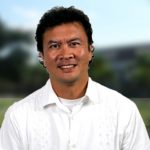
Jose Lopez, Ph.D., associate professor in the Farquhar College of Arts and Sciences and NSU’s Oceanographic Center, has been examining the marine sponge as an important model organism for diverse marine studies. As part of the college’s Climate-Sustainability Lecture Series, hosted by the Division of Math, Science, and Technology, Lopez will discuss his work in a presentation titled “Life at the Bottom: Marine Sponges as Microbial Incubators and Bioindicators.” The talk will take place on Friday, Feb. 10, from noon to 1:00 p.m., in the Mailman-Hollywood Building, room 309.
Marine sponges are home to myriad microbial partners (symbionts) that make them microbial incubators, as well as biosynthetic factories for potentially therapeutic natural products. Based on the premise that hydrocarbons, components of crude oil, act as toxicants to marine organisms, Lopez and his colleagues have begun testing local Florida reef sponges as possible bioindicators for the effects of oil spills. Various molecular methods and electron microscopy are being used to establish baseline values. These parameters are applied in experiments and in situ-sponge samples for the effects of oil and dispersant dosing.
The Climate-Sustainability Lecture Series aims to increase the understanding of the science, technology, and policies relating to climate change and sustainable development. Experts in related fields from within NSU and other institutions are featured speakers. These lectures give faculty members and students the opportunity to discuss the scientific, technological, social, and policy aspects of sustainability-related issues.
All are welcome to attend this talk. For more information, contact Song Gao, Ph.D., assistant professor in the Farquhar College of Arts and Sciences, at (954) 262-8388.

